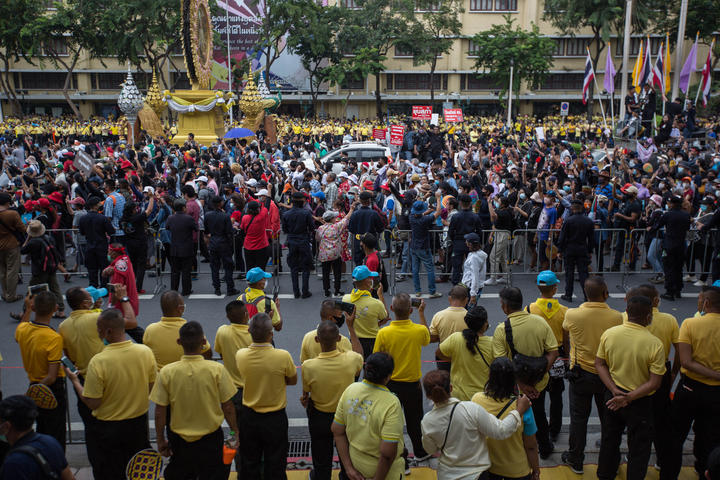Thai protests: Thousands gather in Bangkok as king returns to country
Pro-democracy protesters in Thailand have confronted a motorcade carrying King Maha Vajiralongkorn as it passed through a rally in Bangkok.
The protesters, who were pushed back by ranks of police, raised the three-finger salute that has become a symbol of the protest movement.
They have called for curbs on the king’s powers and for the resignation of Prime Minister Prayuth Chan-ocha.
The protests on Wednesday follow months of escalating tension in the country.
The king, who spends most of his time abroad but has returned from Germany for several weeks, travelled in a car alongside Queen Suthida through a crowd of peaceful protesters, who chanted and raised their hands in the three-finger salute. The gesture is thought to have been inspired by the Hunger Games films in which it is used as a symbol of unity and defiance.
The royal couple were on their way to a Buddhist ceremony on Ratchadamnoen Avenue, where demonstrations had taken place earlier in the day, before the protesters moved on towards Government House. The protesters had vowed not to block the royal motorcade’s passage and they did not.

Thailand’s Queen Suthida and Prince Dipangkorn Rasmijoti in the motorcade as anti-government protesters (back) hold up their three-finger salute. Photo: AFP
Supporters of the monarchy, dressed in t-shirts in royal yellow colour, staged rival protests in the capital, with some filmed violently attacking the pro-democracy protesters. Some witnesses accused the government of disguising police as royalist demonstrators.
The two sides gathered separately along Ratchadamnoen Avenue on Wednesday afternoon and were kept largely apart by police. The anti-government protesters linked arms and marched chanting “Prayuth, get out!” – referring to the prime minister – and “Long live the people!”
The protesters were prevented from reaching Government House by what appeared to be ranks of royalist supporters wearing yellow t-shirts who linked arms and shouted insults at the protesters.
“We want to show that we love the king,” 47-year-old Sirilak Kasemsawat told AFP news agency, accusing the pro-democracy movement of wanting to “overthrow” the monarchy – a charge the movement has always denied.
“We’re not asking them to be toppled, forgotten, or not to be respected,” said Dear Thatcha, a pro-democracy protester. “We’re just asking them to change with us. Our country needs to adapt to many things, and the monarchy is one of the issues that needs to be adapted as well,” she said.
The growing student-led protest movement, which began in July, has become the greatest challenge in years to Thailand’s ruling establishment. Protests over the weekend in the capital were some of the largest in years, with thousands defying authorities to gather and demand change.
The protesters’ calls for royal reform are particularly sensitive in Thailand, where criticism of the monarchy is punishable by long prison sentences.

Pro-democracy protesters walk towards Government House, as people dressed in pro-monarchy yellow t-shirts look on. Photo: AFP / Anadolu Agency
Why are there protests?
Thailand has a long history of political unrest and protest, but a new wave began in February after a court ordered a fledgling pro-democracy opposition party to dissolve.
The Future Forward Party (FFP) had proved particularly popular with young, first-time voters and garnered the third-largest share of parliamentary seats in the March 2019 election, which was won by the incumbent military leadership.
Protests were re-energised in June when prominent pro-democracy activist Wanchalearm Satsaksit went missing in Cambodia, where he had been in exile since the 2014 military coup.
His whereabouts remain unknown and protesters accuse the Thai state of orchestrating his kidnapping – something the police and government have denied. Since July there have been regular student-led street protests.
Demonstrators have demanded that the government headed by Prime Minister Prayuth, a former army chief who seized power in the coup, be dissolved; that the constitution be rewritten; that the authorities stop harassing critics.
– BBC
